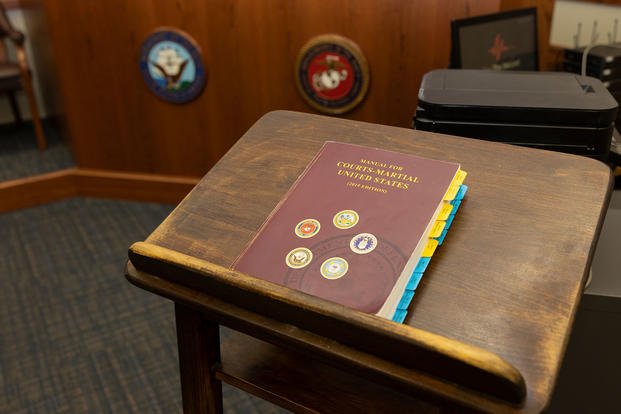Cases of sexual assault and some other serious crimes in the military will now officially be handled by independent prosecutors instead of commanders.
The so-called special trial counsel offices for each of the military services became fully operational Thursday, complying with a congressional mandate to remove prosecutorial decisions for 13 serious offenses from the chain of command.
"This shift should assure sexual assault victims that if they choose to make an unrestricted report, the case will be handled professionally and consistently with the best practices and procedures of civilian prosecution offices," a senior defense official told reporters on a recent call previewing Thursday's announcement. Officials on the call spoke on condition of anonymity under ground rules set by the Pentagon.
Read Next: Inside the Pentagon's Painfully Slow Effort to Clean Up Decades of PFAS Contamination
Two years ago, after almost a decade of efforts by advocates, Congress mandated the creation of special trial counsel offices with the goal of combating sexual assault by eliminating commanders' influence on prosecutions and bringing the military justice system more in line with civilian courts. Congress set a two-year deadline for the offices to be up and running.
Advocates and lawmakers who supported the changes argued that commanders were not impartial decision-makers and at times appeared hesitant to take up cases that could end careers of service members they were close to.
For years, the Pentagon had resisted removing any prosecutions from the chain of command, arguing that doing so could undermine good order and discipline. But after flailing efforts to eradicate sexual assault in the ranks, Pentagon officials backed independent prosecutors for certain crimes, paving the way for Congress' action.
The special trial counsel offices will now be in charge of prosecuting cases of sexual assault, revenge porn, murder, manslaughter, sexual assault of a child, kidnapping, domestic violence, stalking, retaliation, child pornography, sexual misconduct, death or injury of an unborn child, and use of the mail to send obscene material. In 2025, sexual harassment will be added to the list of crimes under their purview.
Even before the formal launch of the offices, the reform that was hailed as a sea change in the way the military will approach sexual assault has been marred by controversy. Earlier this month, the Army fired the prosecutor originally appointed to lead its special trial counsel office after a 2013 email surfaced in which he appeared to disparage sexual assault survivors.
The episode led survivors' advocates to question whether ingrained bias in the military is hampering the reform effort, but military officials have downplayed any concerns about the firing and what it might say about the services.
"Like any sort of unexpected change, this has been a test of our resiliency as an organization, but I'm happy to say we've passed that test with flying colors," a senior Army official told reporters on the call. "Just to be clear, there's been no impact on our ability to begin exercising independent authority on Dec. 28 and start doing our jobs."
Officials from each of the services indicated there has been no change in vetting for prosecutors since the Army firing, with the process entailing the normal promotions board and Senate confirmation system.
Each military service has appointed a lead special trial counsel and set up field offices at several bases around the country and abroad. Brig. Gen. Kevin Woodard is the lead Marine Corps prosecutor, Rear Adm. Jonathan Stephens is the Navy's, and Brig. Gen. Christopher Brown is the Air Force's. After the Army firing, Col. Robert Rodrigues is leading the Army office on an acting basis.
The Army has 65 prosecutors in its special trial counsel office, the Navy has 47 prosecutors, the Marines have 33 and the Air Force has 40, senior officials for each of the services told reporters.
With the exception of the Navy, every prosecutor has been certified as a special trial counsel, meaning they underwent training in handling the specific crimes carved out under the new process. In the Navy, 24 of its prosecutors have been certified and will act as senior litigators, while the rest will assist on cases, a senior service official said. The Navy expects another 10 of its prosecutors will be certified by the summer, the official added.
Each certified prosecutor for all the services is expected to handle about eight to 12 courts-martial per year and about 50 criminal investigations overall, the service officials said.
While Thursday marks the official opening of the offices, prosecutors have been providing advice on some cases while the offices were set up. They are expected to continue consulting on those cases, but officials do not anticipate they will take over leading the prosecution if a case is already far along.
Recognizing that sexual assault survivors sometimes don't feel comfortable reporting the assault until years later or that serial abusers can have crimes that span years, the special trial counsel offices will have the authority to "reach back" and prosecute alleged crimes that happened before Thursday, officials said. The special trial counsel offices may also choose to take up some cases that were reported before Thursday if they are still in preliminary stages.
"We are making decisions based on the facts, on the evidence and unencumbered by perhaps some of the pressures or concerns that senior commanders might feel," the senior Army official said. "There's no concern for our careers about which cases we send forward or don't send forward. We're just interested in achieving justice."
Related: Military Justice Reforms at Finish Line After Decade-Long Fight











